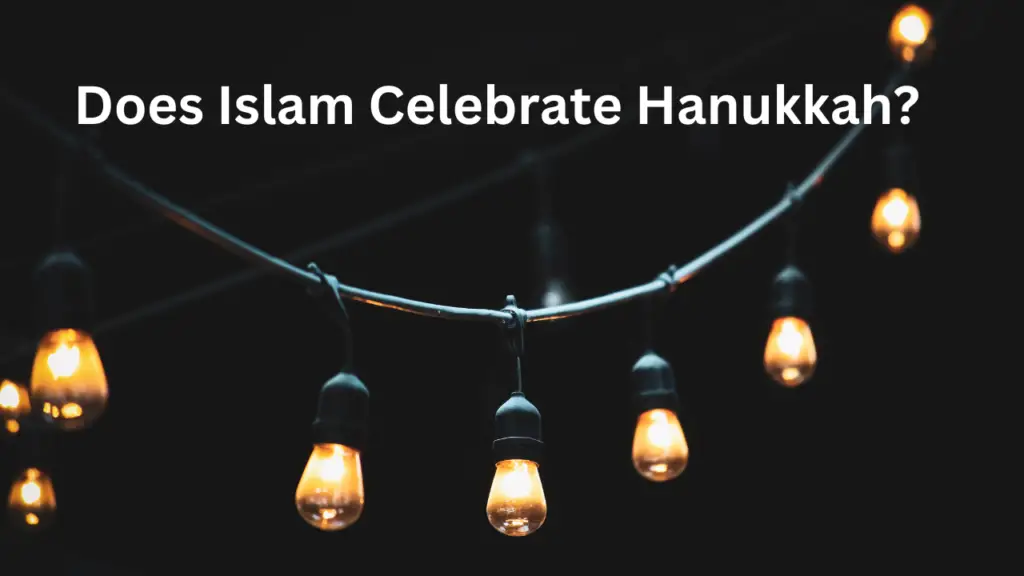Does Islam Celebrate Hanukkah?
"Exploring the Intersection: Hanukkah's Place in Islamic Tradition"


Introduction
The celebration of Hanukkah, also known as the Festival of Lights, is a significant event in the Jewish calendar. It commemorates the rededication of the Second Temple in Jerusalem and the miracle of a small amount of oil lasting for eight days. While Hanukkah holds deep meaning within Judaism, questions have arisen about whether the celebration holds any significance or participation in the Islamic faith. This article delves into the historical, cultural, and religious perspectives to explore whether Islam celebrates Hanukkah.
The Historical and Cultural Context
Hanukkah is primarily a Jewish holiday with roots in the Maccabean Revolt against the Seleucid Empire around 167 BCE. The celebration’s central theme revolves around religious freedom and resilience. During the time of the revolt, the Jewish people fought to preserve their faith against Hellenistic influences and restore the sanctity of the Second Temple. The miracle of the oil lamp burning for eight days became a symbol of divine intervention and faithfulness.
Islam, on the other hand, emerged in the 7th century CE in the Arabian Peninsula through the revelations given to Prophet Muhammad. While there are shared historical connections between Judaism and Islam, including shared prophets like Abraham and Moses, Hanukkah’s origins occurred centuries before the emergence of Islam. Consequently, Hanukkah is not a holiday explicitly mentioned or celebrated within the Islamic tradition.
Religious Considerations
The Islamic calendar is based on the lunar calendar, while the Jewish calendar follows a lunisolar system. As a result, Islamic holidays shift through the Gregorian calendar, while Jewish holidays move through their own calendar. The timing of Hanukkah, which typically falls in December, does not coincide with any major Islamic holidays. This temporal separation further emphasizes the distinction between the two celebrations.
Moreover, religious practices differ between Islam and Judaism. Islam places a strong emphasis on the worship of the one God, Allah, and the observance of the Five Pillars of Faith, which include the declaration of faith, prayer, fasting, charity, and pilgrimage. While both Islam and Judaism share a commitment to monotheism, their specific rituals and practices are distinct.
Cultural Exchange and Coexistence
Throughout history, various regions have witnessed instances of cultural exchange and coexistence between Muslim and Jewish communities. This has led to interactions between religious traditions and shared practices, as well as the recognition of each other’s celebrations. In some cases, Muslims and Jews have participated in each other’s festivities as a sign of respect and solidarity, particularly in places where the two communities coexist peacefully.
However, it’s important to note that these instances of cultural exchange do not imply that Islam officially celebrates Hanukkah as a religious holiday. Rather, they reflect the broader value of interfaith understanding and respect for diverse traditions.
Interfaith Dialogue and Understanding
As the world becomes increasingly interconnected, interfaith dialogue and understanding have gained significance. Muslims and Jews, along with followers of other religions, have engaged in conversations aimed at promoting tolerance, harmony, and coexistence. These dialogues highlight the similarities and differences between their traditions, fostering an environment of mutual respect.
While Islam does not formally celebrate Hanukkah, exploring the history and significance of Jewish holidays like Hanukkah can contribute to broader interfaith conversations. Learning about each other’s traditions can help break down stereotypes and misconceptions, ultimately promoting peaceful coexistence and cooperation.
Conclusion
In conclusion, Hanukkah is a Jewish holiday that holds immense cultural and religious significance within the Jewish community. While Islam does not officially celebrate Hanukkah, there have been instances of cultural exchange and mutual respect between Muslim and Jewish communities. Understanding the historical, cultural, and religious context of both traditions can promote interfaith dialogue and enhance our appreciation for the diversity of human cultures and beliefs. As our world becomes more interconnected, fostering understanding and cooperation among different faiths remains a vital step toward a more harmonious global society.
Does Islam Celebrate Hanukkah?
No, Hanukkah is not a religious holiday within the Islamic tradition. It is a Jewish holiday that commemorates the rededication of the Second Temple in Jerusalem and the miracle of the oil lasting for eight days.
Are there any references to Hanukkah in the Islamic scriptures?
No, there are no references to Hanukkah in the Quran or Hadith (sayings of Prophet Muhammad). Hanukkah predates the emergence of Islam by several centuries.
Do Muslims celebrate Hanukkah?
Muslims do not typically celebrate Hanukkah as part of their religious practices. However, in some cases of interfaith coexistence, Muslims may participate in Hanukkah celebrations out of respect and solidarity with their Jewish neighbors.
Are there any similarities between Hanukkah and Islamic holidays?
While Hanukkah and Islamic holidays have distinct origins and significance, both emphasize the themes of faith, resilience, and dedication. Hanukkah’s story of rededicating the temple and the endurance of a small amount of oil can parallel Islamic values of perseverance and devotion.
Are there instances of Muslims and Jews celebrating each other’s holidays?
Yes, in regions where Muslim and Jewish communities coexist peacefully, there have been instances of cultural exchange and mutual respect. Muslims and Jews might participate in each other’s festivities as a sign of friendship and understanding.
How do Islamic and Jewish beliefs about the afterlife differ?
Islamic beliefs about the afterlife include concepts like Paradise (Jannah) and Hell (Jahannam), where individuals are judged based on their deeds. Jewish beliefs about the afterlife can vary, with some focusing on the idea of Olam Ha-Ba (the World to Come) and the eternal connection with God.
Is learning about Hanukkah important for Muslims?
Learning about Hanukkah can contribute to interfaith dialogue and understanding. While Islam does not celebrate Hanukkah, gaining knowledge about the traditions of other faiths fosters respect and harmony among diverse communities.
How can Muslims and Jews engage in interfaith dialogue?
Interfaith dialogue involves open conversations where Muslims and Jews can share their beliefs, values, and practices. Engaging in respectful discussions can help break down stereotypes, build bridges, and promote peaceful coexistence.
Are there any joint initiatives between Muslim and Jewish communities?
Yes, in various parts of the world, Muslim and Jewish communities collaborate on initiatives that promote peace, social justice, and understanding. These initiatives aim to strengthen relations between the two communities and address common challenges.
What’s the significance of understanding different faiths?
Understanding different faiths is crucial for fostering tolerance, harmony, and global cooperation. It promotes empathy, dispels misconceptions, and contributes to a more interconnected and peaceful world.





